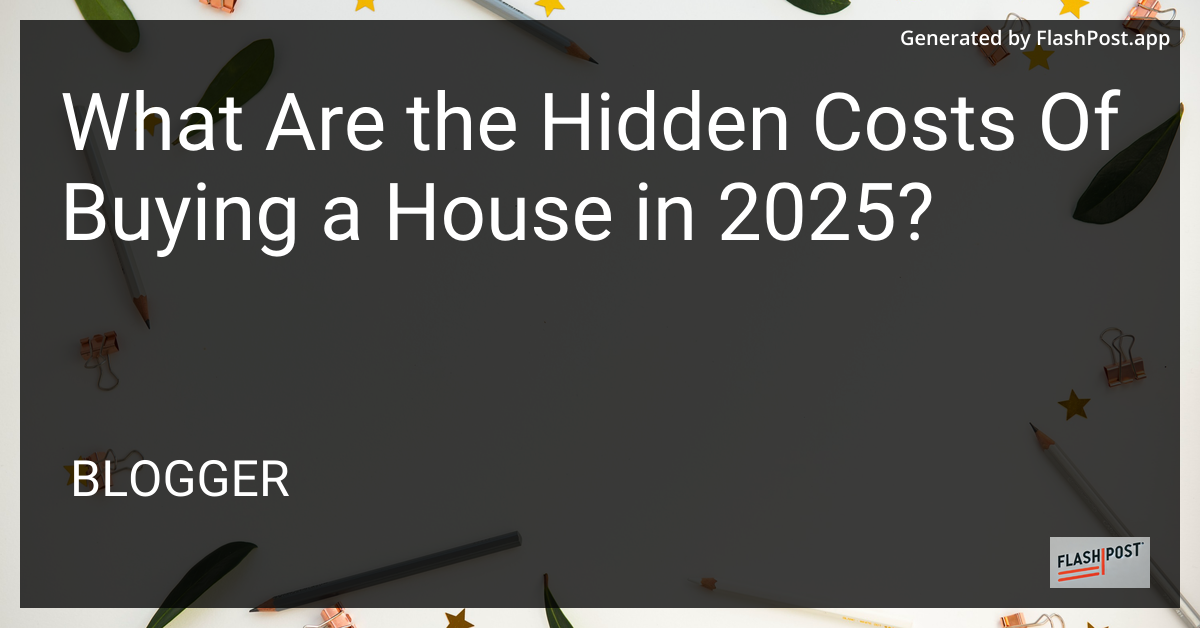What Are the Hidden Costs Of Buying a House in 2025?

Understanding the Hidden Costs of Buying a House in 2025
Buying a house remains one of the most significant financial decisions you’ll make in your lifetime. While most buyers prepare for the obvious costs, such as the purchase price, down payment, and mortgage, many are caught off guard by hidden costs that can substantially add to the overall expense of owning a home in 2025. Understanding these hidden costs can help you be better prepared and avoid any unpleasant financial surprises.
1. Closing Costs
Closing costs are often the most significant hidden expenses that home buyers encounter. These costs typically range from 2% to 5% of the home’s purchase price and include fees for services such as loan origination, title insurance, escrow, and more. Navigating the escrow process in real estate can help demystify these expenses, allowing for better financial planning.
2. Home Inspection and Appraisal Fees
Before finalizing your purchase, you will likely need to pay for a home inspection and appraisal. These assessments are critical in determining the home’s condition and market value, guiding both your purchasing decision and negotiations with the seller. While these inspections are essential, their costs may not be immediately evident in your budget.
3. Property Taxes
Property taxes are recurring expenses that can often be underestimated by new homeowners. These taxes vary significantly by location and are subject to change based on local government budget needs. It’s crucial to research property tax rates before purchasing and factor in potential increases over time.
4. Homeowners Insurance and Private Mortgage Insurance (PMI)
Most mortgage lenders require some form of homeowners insurance to protect against damage and loss. If your down payment is less than 20% of the home’s value, you may also need to pay for PMI to protect the lender’s investment. Both of these can add hundreds of dollars to your monthly homeownership cost.
5. Maintenance and Repairs
Houses require ongoing maintenance, which can range from minor repairs to more significant issues such as roof replacements or plumbing problems. It’s wise to establish a home maintenance budget to address unexpected repairs, ensuring your financial stability over time.
6. HOA Fees and Special Assessments
If you purchase a property within a housing association, you will likely be subject to homeowners association (HOA) fees. These fees cover various community amenities and services but can be substantial. Additionally, special assessments may be levied for large communal expenditures, such as roof repairs or road maintenance.
7. Utility Costs
Utility costs, including water, electricity, gas, and sewage, can significantly impact your monthly expenses. New homeowners often underestimate these costs, particularly if they’re used to renting in a multi-unit building where some utilities are shared or included in rent. Be sure to account for these when budgeting for a home purchase.
Conclusion
Purchasing a house involves many more costs than just the sale price, and being aware of these hidden fees is crucial for financial preparedness. By understanding these expenses upfront, you can more accurately determine your affordability range and make informed decisions. For those looking to grasp the comprehensive nature of real estate, starting a real estate business could provide deeper insights into the industry. Additionally, keeping an eye on developments, such as new real estate educational tools, can benefit those entering the market or seeking professional advancement. For instance, you might want to look at the real estate exam frequency in Alaska to better understand the educational demands in different regions.
With careful planning and budgeting, you can successfully navigate the hidden costs of buying a home in 2025, ensuring a smoother transition into your new property.
Comments
Post a Comment